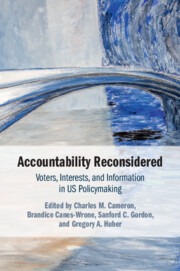Book contents
- Frontmatter
- Dedication
- Contents
- Figures
- Tables
- Contributors
- Acknowledgments
- 1 Introduction
- Part I Candidate Evaluation and Selection
- Part II The Media and The Informational Environment
- Part III Policymaking, Information Provision, and Accountability
- 9 Coalition Leadership in the Polarized Congress
- 10 Fire Alarms and Democratic Accountability
- 11 Achieving Accountability: Aligning Institutions and Behavior
- Part IV Outside The Public Eye? Private Interests and Policymaking
- Bibliography
- Author Index
- Subject Index
9 - Coalition Leadership in the Polarized Congress
from Part III - Policymaking, Information Provision, and Accountability
Published online by Cambridge University Press: 09 February 2023
- Frontmatter
- Dedication
- Contents
- Figures
- Tables
- Contributors
- Acknowledgments
- 1 Introduction
- Part I Candidate Evaluation and Selection
- Part II The Media and The Informational Environment
- Part III Policymaking, Information Provision, and Accountability
- 9 Coalition Leadership in the Polarized Congress
- 10 Fire Alarms and Democratic Accountability
- 11 Achieving Accountability: Aligning Institutions and Behavior
- Part IV Outside The Public Eye? Private Interests and Policymaking
- Bibliography
- Author Index
- Subject Index
Summary
In the first chapter in Part III, Frances Lee shifts the focus from elections to governing in the context of contemporary American politics. She examines the strategies of coalition leaders in Congress, who now operate in a world of highly polarized congressional parties. She scrutinizes the two major legislative efforts of the 115th Congress (2017-18): tax reform and the repeal and replacement of the Affordable Care Act. Lee finds that coalition leaders used many of the same techniques as in earlier periods. In particular, coalition leaders substantially modified their proposals to reduce the costs imposed on the constituents of legislators whose votes they needed. Similarly, leaders deployed procedural tactics to break the linkage between Congressional action and painful policy effects. These efforts were successful on tax reform but ultimately failed with the efforts to repeal the ACA, and Lee finds the failure was related to the traceable costs of the proposed policy change. She concludes that although polarization has arguably created new challenges for enacting major legislation, the strategies of coalition builders exhibit a good deal of continuity.
Keywords
- Type
- Chapter
- Information
- Accountability ReconsideredVoters, Interests, and Information in US Policymaking, pp. 197 - 220Publisher: Cambridge University PressPrint publication year: 2023

